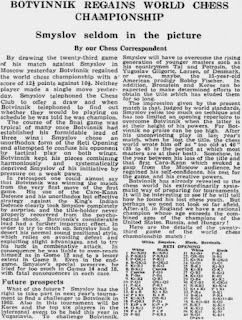May 10 1958
The Guardian, London, Greater London, England, Saturday, May 10, 1958
BOTVINNIK REGAINS WORLD CHESS CHAMPIONSHIP
Smyslov seldom in the picture
By our Chess Correspondent
By drawing the twenty-third game of his match against Smyslov in Moscow yesterday Botvinnik regained the world chess championship with a score of 12½ points against 10½. Neither player made a single move yesterday. Smyslov telephoned the Chess Club to offer a draw and when Botvinnik telephoned to find out whether they would be playing on schedule he was told he was champion.
The course of the final game was typical of many once Botvinnik had established his formidable lead of three wins: Smyslov chose an unorthodox form of the Reti Opening and attempted to confuse his opponent by tactical play on both wings. Botvinnik kept his pieces combining harmoniously and systematically deprived Smyslov of his initiative by pressure on a weak pawn.
In retrospect one could almost say that Botvinnik was winning the match from the very first move of the first game. His use of the Caro-Kann Defence and his unorthodox but effective strategy against the King's Indian Defence clearly took Smyslov completely by surprise, and the title-holder never properly recovered from the psychological shock. Botvinnik's considerable lead had a further important effect. In order to try to catch up, Smyslov had to desert his normal sound positional style, which relies on avoiding defeat and exploiting slight advantages, and to try his luck in combinative attack. In consequence he was liable to over-reach himself as in Game 12 and to a lesser extent in Game 9. Even in the endgame, Smyslov's special preserve, he tried for too much in Games 14 and 18, with fatal consequences in each case.
Future prospects
What of the future? Smyslov has the right to take part in next year's tournament to find a challenger to Botvinnik in 1960. Also in this tournament will be Keres and the top six players in the interzonal event to be held this year in Yugoslavia. To challenge Botvinnik, Smyslov will have to overcome the rising generation of younger masters such as his countrymen Tal and Petrosian, the Yugoslav Gligoric, Larsen, of Denmark, or even, maybe, the 15-year-old American prodigy Bobby Fischer. In addition, Bronstein and Keres can be expected to make determined efforts to obtain the title which has eluded them for so long.
The impression given by the present match is that, judged by world standards, Smyslov relies too much on technique and has too limited an opening repertoire to overcome Botvinnik when the latter is at their height of his powers. For Botvinnik no praise can be too high. After his unconvincing play in last year's match, when he lost the title, the chess world wrote him off as “too old at 46” (35 to 45 is the period at which most masters are at their best). Somehow, in the year between his loss of the title and that first Caro-Kann which evoked a gasp from the Moscow audience, he regained his self-confidence, his zest for the game, and his creative powers.
Botvinnik has already revealed to the chess world his extraordinarily systematic way of preparing for tournaments. It will be interesting to see if he will tell how he found his lost chess youth. But perhaps we need not look so far afield. After all, in England we have a national champion whose age exceeds the combined ages of the champions of the United States, Russia, and Hungary.























